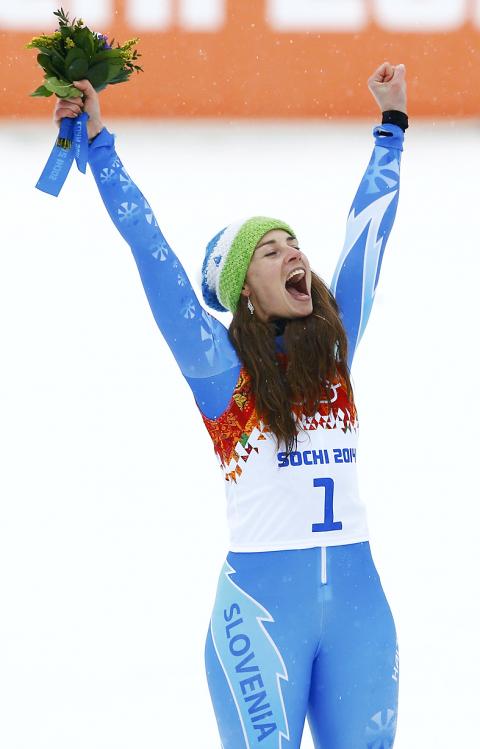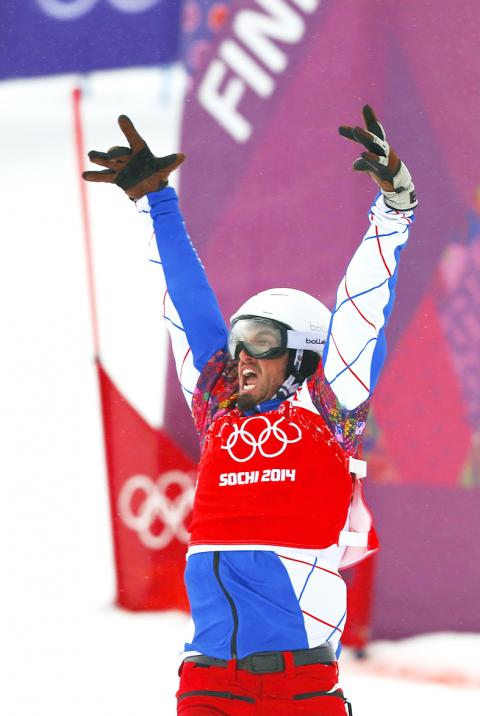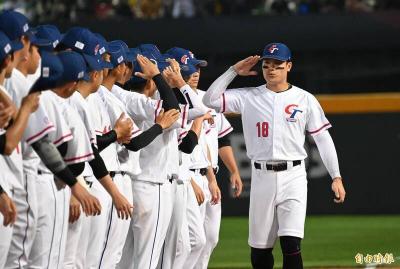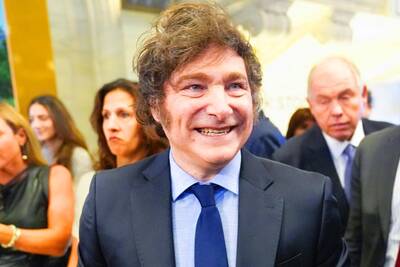Tina Maze of Slovenia swept through the clouds and rain yesterday to win her second gold of the Sochi Olympics after edging Austrian Anna Fenninger in the women’s giant slalom.
Maze was in the first-ever Olympic Alpine skiing tie in the downhill, in which she clocked the same time as Swiss Dominique Gisin, and was only 0.07 seconds away from a repeat in the slalom despite building a half-second lead in the first run.
Germany’s Viktoria Rebensburg, the giant slalom champion in Vancouver four years ago, produced a superb second run to snatch the bronze behind Fenninger, who won the super-G gold at the weekend.

Photo: Reuters
After disappointment in the opening super combined race at Rosa Khutor, Russia, where she missed a medal, all-rounder Maze has gone from strength to strength.
“I feel really wet, but I feel great to win my second gold,” Maze, who won last season’s overall World Cup with a record-breaking points total, told reporters.
Having carved out a 0.52 second advantage in the first run, Maze was the favorite to win when the second run began after a short delay due to a snowstorm at the top of the hill.

Photo: Reuters
US teenager Mikaela Shiffrin — fifth after the first leg — briefly looked in contention for a medal in her Olympic debut, but stayed fifth.
Rebensburg’s second attempt through the 54 gates elevated her to third, 0.10 seconds behind Fenninger, who was delighted with a silver to add to her super-G gold.
“If [before the Games] someone said I would get two medals, I would have said: ‘That’s nice, but it’s too hard,’” Fenninger said.
Former Olympic giant slalom champ Julia Mancuso of the US missed a gate in her first run, while another contender, Germany’s Maria Hoefl-Riesch, did not start.
Violin virtuoso Vanessa Mae, Thailand’s first-ever Olympic female skier, came last, but was still bubbling with joy after finishing the slushy course.
The Singapore-born Brit came through the finish line in 67th place after two runs, a massive 50.10 seconds behind Maze.
Coming hesitantly out of the starting gate, Mae clocked 3 minutes, 26.97 seconds down the course, 11.35 seconds behind her closest rival, Xia Lina of China. However, unlike 22 others who failed to make it down, the former child prodigy finished both runs
The 35-year-old Mae, who raced under the name Vanessa Vanakorn, said she was happy with her result.
“I expected to be last, but at the end of the day, the Olympics is a great opportunity,” she said after her first run. “I nearly crashed three times, but I made it down and that was the main thing.”
“I’m a last-minute kind of girl, I mean training for the Olympics with six months to go was a last-minute thing,” Mae added. “My main purpose of being here was to really have a good time, to improve my skiing in a very short amount of time.”
Although a UK citizen, strict British Olympic Association rules on team selection for alpine skiing saw Mae take Thai citizenship in her bid to compete in the Games.
The violinist — who has said music is her “lifelong passion” and skiing her “lifelong hobby” — dismissed talk of a skiing injury possibly hurting her other career.
“You have to take risks in life at the end of the day. You can insure yourself up to your eyeball, but you won’t enjoy life,” she said.

The qualifying round of the World Baseball Classic (WBC) is to be held at the Taipei Dome between Feb. 21 and 25, Major League Baseball (MLB) announced today. Taiwan’s group also includes Spain, Nicaragua and South Africa, with two of the four teams advancing onto the 2026 WBC. Taiwan, currently ranked second in the world in the World Baseball Softball Confederation rankings, are favorites to come out of the group, the MLB said in an article announcing the matchups. Last year, Taiwan finished in a five-way tie in their group with two wins and two losses, but finished last on tiebreakers after giving

North Korea’s FIFA Under-17 Women’s World Cup-winning team on Saturday received a heroes’ welcome back in the capital, Pyongyang, with hundreds of people on the streets to celebrate their success. They had defeated Spain on penalties after a 1-1 draw in the U17 World Cup final in the Dominican Republic on Nov. 3. It was the second global title in two months for secretive North Korea — largely closed off to the outside world; they also lifted the FIFA U20 Women’s World Cup in September. Officials and players’ families gathered at Pyongyang International Airport to wave flowers and North Korea flags as the

For King Faisal, a 20-year-old winger from Ghana, the invitation to move to Brazil to play soccer “was a dream.” “I believed when I came here, it would help me change the life of my family and many other people,” he said in Sao Paulo. For the past year and a half, he has been playing on the under-20s squad for Sao Paulo FC, one of South America’s most prominent clubs. He and a small number of other Africans are tearing across pitches in a country known as the biggest producer and exporter of soccer stars in the world, from Pele to Neymar. For

A debate over the soul of soccer is raging in FIFA World Cup holders Argentina, pitting defenders of the social role of the beautiful game against the government of libertarian Argentine President Javier Milei, who wants to turn clubs into for-profit companies. Argentina, which gave the world Diego Maradona and Lionel Messi, is home to some of the world’s most devoted soccer fans — a fact attributed by supporters like Gabriel Nicosia to the clubs’ community outreach. Nicosia is a lifelong supporter of San Lorenzo, a more than 100-year-old first division club based in the working-class Buenos Aires neighborhood of Boedo where